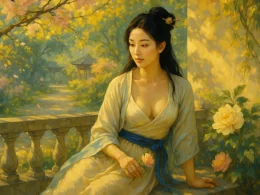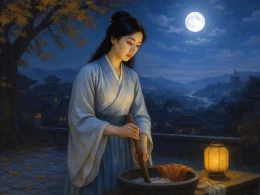Breaking Mount Heaven’s Gate, the great River rolls through;
Green billows eastward flow and here turn to the north.
From both sides of the River thrust out the cliffs blue;
Leaving the sun behind, a lonely sail comes forth.
Original Poem
「望天门山」
李白
天门中断楚江开,碧水东流至此回。
两岸青山相对出,孤帆一片日边来。
Interpretation
Composed around 725 CE when the young Li Bai first left his homeland in Sichuan and sailed east past Tianmen Mountain, this work captures the poet's inaugural encounter with the Wu-Chu region's majestic landscape. The breathtaking rivers and mountains resonated deeply with his ambitious spirit, producing this masterpiece hailed as "divine work of landscape poetry." The poem not only depicts natural wonders but also achieves perfect fusion between the poet's spirit and cosmic grandeur.
First Couplet: "天门中断楚江开,碧水东流至此回。"
Tiānmén zhōngduàn Chǔ jiāng kāi, bì shuǐ dōng liú zhì cǐ huí.
Tianmen's peaks split by Chu River's force; East-flowing jade waters swirl at their source.
The opening bursts with cosmic power. "Peaks split" imbues nature with dramatic force, evoking primordial world-shaping energy. "Split" suggests both the river's action and the poet's expanding vision and mind. "Swirl" precisely captures the water's whirlpools where current meets mountains, adding dynamic curvature to the grandeur, showing Li Bai's keen observation of natural physics.
Second Couplet: "两岸青山相对出,孤帆一片日边来。"
Liǎng'àn qīngshān xiāngduì chū, gū fān yīpiàn rì biān lái.
Green cliffs on both banks emerge face to face; A lone sail from sun's edge finds its place.
This couplet achieves masterful perspective shift. "Emerge" animates stillness, giving mountains life-like主动性—both realistic boat-moving effect and projection of the poet's excitement. "Lone sail from sun's edge" draws gaze to infinite distance, placing a solitary but determined traveler against vastness. This "lone sail" is both real scene and the poet's self-symbol, carrying his dream and courage toward broader horizons.
Holistic Appreciation
The poem's artistic achievement lies in constructing a multidimensional, pulsating space. Vertically: towering "Tianmen" confronts deep-flowing "jade waters"; horizontally: eastward flow intertwines with swirling whirlpools; distantly: "emerging" cliffs echo the "sun-edge" approaching sail. Through verbs like "split," "flow," "swirl," "emerge," and "come," Li Bai animates landscape with dynamic power. The poet isn't a detached observer but fully immerses himself (the lone sail) into this cosmic journey, achieving the transcendent state where "landscape becomes me, I become landscape," perfectly showcasing High Tang poets' cosmic embrace.
Artistic Merits
- Dynamic Imagery Combination: A series of impactful verbs transform static scenery into dramatic movement, creating unique "walking landscape" aesthetic effect.
- Creative Subjective Perspective: "Emerge face to face" and "from sun's edge comes" aren't objective descriptions but subjective experiences based on boat travel—this "emotion projection onto scenery" greatly enhances immersive power.
- Perfect Macro-Micro Contrast: Majestic "Tianmen Mountain" and "Chu River" contrast sharply with tiny "lone sail," highlighting nature's power while emphasizing human courage to explore and embrace the world.
- Strategic Color and Light: "Jade waters" and "green cliffs" form cool-toned foundation, while "sun's edge" injects warm light and infinite brightness, creating open, brilliant conception.
Insights
This poem offers a majestic outlook toward world and life. True magnificence exists in dynamic journeys, in fierce collision and harmonious coexistence between subject and object. Li Bai's poetry enlightens us: however small the individual (like a lone sail), with courage to "raise my sail and cross the sea," one can travel with the grandest cosmos. Today, this spirit inspires us to leave comfort zones, collide with opportunities ("swirl" like the waters) in broader worlds, and journey toward bright futures with "sun-edge" aspirations, even when alone.
About the poet

Li Bai (李白), 701 - 762 A.D., whose ancestral home was in Gansu, was preceded by Li Guang, a general of the Han Dynasty. Tang poetry is one of the brightest constellations in the history of Chinese literature, and one of the brightest stars is Li Bai.












